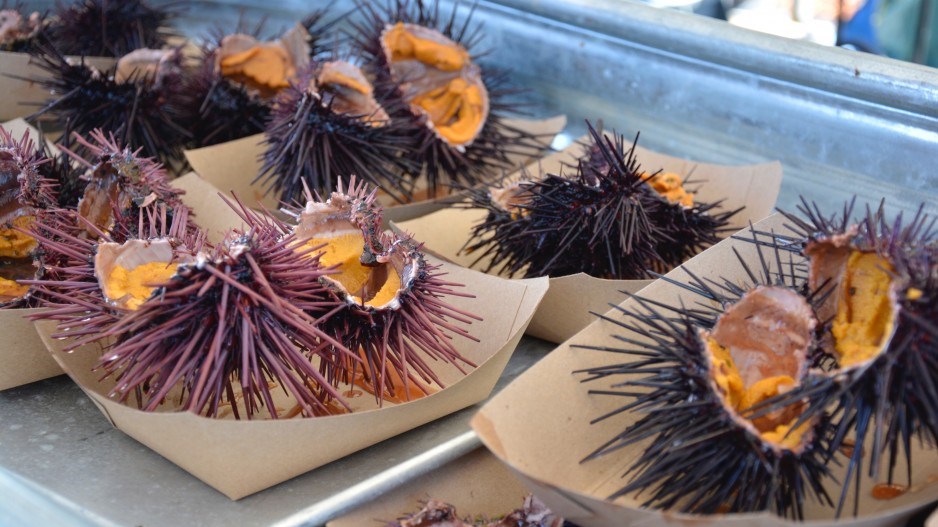B.C. and Canadian food producers are eyeing an unusual new entry point into the lucrative European market: Copenhagen.
At first glance, targeting the capital city of Denmark, which has a population of six million and ranks 16th among the 27 European Union member states, does not appear to make strategic sense given its size. But officials say Copenhagen’s market for commodities such as B.C.’s seafood, which is well established in Asia but much less known in Europe, lies in its culinary reputation and influence.
“We’ve branded Copenhagen as the Silicon Valley for food,” said Jakob Schmidt, Canada’s trade commissioner at the Canadian embassy in Denmark. “It’s a very international scene with a very condensed network of top-level chefs; the city has around 16 Michelin Star restaurants, with 28 in Denmark overall, and we only have around one million people in Copenhagen. So the quality of the food scene is very high, and the interest in finding new products – the next major trend – is strong. It’s a great market to validate the quality of your products.... In terms of influence that this can have on your product, it’s quite substantial.”
That’s why Copenhagen was the target of a recent Taste of Canada accelerator program spearheaded by Canadian and B.C. trade officials in Europe, as a number of companies showcasing the province’s top offerings made the trip to Denmark in late October to court restaurateurs from elite-level establishments like Noma and Alchemist.
“I would call it more like a road show in the sense that we’ve recruited companies from Canada or, in my case – as I’m a representative for the province of British Columbia – from B.C.,” said Melissa Arsenault, operations manager and trade and investment representative for B.C. in Europe. “We partnered with the trade commissioner and created activities.... Meetings were arranged for companies to promote their products directly to the chefs. Each meeting was tailored to a product; without the right products, we would not have gone to those meetings with top chefs.”
The effort really began in earnest a year ago, when Canadian officials began hosting web-based “master-classes” to the local culinary industry on Canadian products, familiarizing people with the goods in a “seeding-the-field” approach to generate interest. That led to two companies visiting Copenhagen in June.
In October, that effort was expanded. B.C. companies took up three of the five spots for the visit; companies from Alberta and Quebec took the other two.
Fraser Rieche, sales and marketing executive for Ocean Master Foods, was one of the B.C. company representatives who made the trip. The company’s feature product, Rieche said, was Uni Fresco (sea urchin caviar).
Typically, sea urchin caviar has a shelf life of between seven and 10 days, which reduces its export window dramatically. But Rieche said his company’s Uni Fresco is packaged in a way that extends that period to almost two months, which makes destinations like Europe much more feasible as an export destination.
What Ocean Master needed, Rieche said, was direct access to Danish chefs. The Taste of Canada accelerator provided that contact.
“I’ve spent a lot of time in the food business trying to build new products, introducing them to new markets, and it has always been a struggle working up from the bottom of the pyramid towards the top. It was like getting your product through one door, then another, then another. This [accelerator] was a real eye-opener. I’ve never had such a short timeline between launch, introduction and acceptance ... and that had to do with the fact that the targeting of the market and tailored, individual access was very well thought out.”
Rieche added that he is already planning to return to Copenhagen in early 2023 with new samples and – more importantly – budgets, sales goals and plans for shipping arrangements. He said he is now expecting Uni Fresco to enter the European market by the end of 2023’s first quarter.
Arsenault noted that selecting products like Ocean Master’s Uni Fresco for the program was crucial because its sophistication fit the Copenhagen market’s demands and represented the brand image that Canadian and B.C. foods want to present when entering a new market.
“I think when we work with B.C. products – or even with others across Canada – we have the same challenge to show people it’s not just about maple syrup,” she said. “Europe is an extremely sophisticated and competitive market. Canadian companies have to prove their products are better than that of existing suppliers. And that’s what we’ve done here, promoting the fact that Canadian products are premium products. That’s the message we want to get across.”
Schmidt said he is already compiling a report on the recent visit and planning followups that include arranging visits to B.C. for Danish food industry officials and perhaps even opening conversations with supermarkets, hotel chains and conference chains.
“This program was basically the door opener,” he said. “Honestly, now is when the hard work begins. And it’s not on me but on people like Fraser to get the sales. But the program is still running in the sense there are still followup calls with our local consultants, just to make sure no leads are missed.... But it’s a really good first step.”




